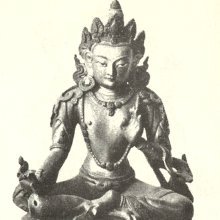Hua: 2 definitions
Introduction:
Hua means something in Jainism, Prakrit, biology. If you want to know the exact meaning, history, etymology or English translation of this term then check out the descriptions on this page. Add your comment or reference to a book if you want to contribute to this summary article.
Images (photo gallery)
Biology (plants and animals)
Source: Google Books: CRC World Dictionary (Regional names)Hua in Philippines is the name of a plant defined with Areca catechu in various botanical sources. This page contains potential references in Ayurveda, modern medicine, and other folk traditions or local practices It has the synonym Areca hortensis Lour. (among others).
Example references for further research on medicinal uses or toxicity (see latin names for full list):
· Species Plantarum
· Hist. Nat. Palm. (1836)
· Taxon (1979)
· Translational Research: the Journal of Laboratory and Clinical Medicine (2007)
· Species Plantarum. (1805)
· Nucleus (1975)
If you are looking for specific details regarding Hua, for example extract dosage, side effects, pregnancy safety, health benefits, diet and recipes, chemical composition, have a look at these references.

This sections includes definitions from the five kingdoms of living things: Animals, Plants, Fungi, Protists and Monera. It will include both the official binomial nomenclature (scientific names usually in Latin) as well as regional spellings and variants.
Languages of India and abroad
Prakrit-English dictionary
Source: DDSA: Paia-sadda-mahannavo; a comprehensive Prakrit Hindi dictionary1) Hua (हुअ) in the Prakrit language is related to the Sanskrit word: Huta.
2) Hūa (हूअ) also relates to the Sanskrit word: Hūta.
Prakrit is an ancient language closely associated with both Pali and Sanskrit. Jain literature is often composed in this language or sub-dialects, such as the Agamas and their commentaries which are written in Ardhamagadhi and Maharashtri Prakrit. The earliest extant texts can be dated to as early as the 4th century BCE although core portions might be older.
See also (Relevant definitions)
Starts with (+149): Hua bao bao chun, Hua chiao, Hua dong fu pen zi, Hua feng xian, Hua gabonii, Hua guai teng gen, Hua hsiang, Hua hualo, Hua huang san feng, Hua jiao, Hua ling cao, Hua ma qian, Hua nan gu jing cao, Hua nan yuan zhi, Hua nan yun shi, Hua pale, Hua pei ju, Hua qi song, Hua ren, Hua shan jiang.
Ends with (+276): Abhua, Achua, Agar pisa hua, Agurulahua, Ahihua, Ahimuhihua, Ahua, Akahua, Akkhua, Anuhua, Appalahua, Atthua, Avihua, Bahua, Bai hua, Bang feng xian hua, Barhua, Barthua, Bathua, Bazar-ul-hua.
Full-text (+478): Huta, Huas, 'hua 'lon, Da hua yu feng hua, Hua-do, Hua ye man chang chun hua, Shao hua guan chun hua, Lan hua feng xian hua, Hua pale, He bao hua, Bai hua, Mosebe, Hua jiao, Mien hua, Xiang hua, Hung hua tsai, Kobadi, Ci huai hua, Long ya hua, Guan hua shu.
Relevant text
Search found 16 books and stories containing Hua, Hūa; (plurals include: Huas, Hūas). You can also click to the full overview containing English textual excerpts. Below are direct links for the most relevant articles:
Dhyana in the Buddhist Literature (by Truong Thi Thuy La)
3.2 (c): The Dhyāna in the Avataṃsaka-sūtra (Hua-Yen) < [Chapter 3 - The Dhyāna in Mahāyāna Literature]
1.4: Organisation of the Present Work < [Chapter 1 - Introduction]
Sūtra of the Great Vow of Kṣitigarbha Bodhisattva
The Novelists of Modern China < [July 1949]
The Chinese Language < [January 1952]
The Spirit of Chinese Painting < [April 1951]
Tattvartha Sutra (with commentary) (by Vijay K. Jain)
Verse 8.13 - The five kinds of obstructive karma (antarāya) < [Chapter 8 - Bondage of Karmas]
Verse 9.35 - Definition of cruel meditation (raudra-dhyāna) < [Chapter 9 - Stoppage and Shedding of Karmas]
Verse 6.21 - Right belief also leads to birth as a heavenly being (vaimānika-deva) < [Chapter 6 - Influx of Karmas]
Bhesajjakkhandhaka (Chapter on Medicine) (by Hin-tak Sik)
